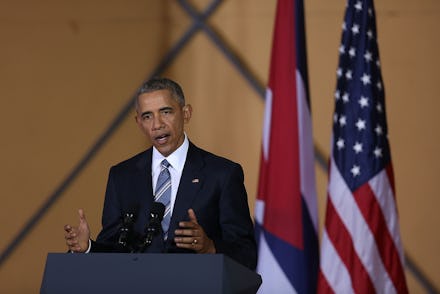Obama Praises Entrepreneurship in Cuba, But Major Hurdles Remain

HAVANA — A thriving private sector economy. A hub for entrepreneurship and innovation. A center for small business and foreign investment.
That's the grand vision that President Barack Obama set forth on Monday, as he spoke directly to several hundred Cuban entrepreneurs, or "cuentapropistas," at a town hall event held at a brewery in downtown Havana. The Q&A session, moderated by former CNN anchor and Cuban American journalist Soledad O'Brien, marked one of the cornerstone events of Obama's historic Cuba trip, an opportunity for him to promote a new economic relationship between the two countries.
Read more: Here's What Young Cuban-Americans Really Think About President Obama's Cuba Trip
Obama used the occasion to highlight several American companies started by young people which are beginning to thrive in Cuba — chief among them Airbnb, which is rapidly growing in the country — as proof of the kind of business success that could be in store as a result of the easing of relations.
"Businesses that start small — even in a garage — can grow into some of the world's most successful companies," Obama told the audience. "That's what we are encouraging here today."
But Obama's vision for a new Cuba stands in stark contrast to the current reality. The event was somewhat overshadowed by a joint press conference held earlier in the day with Cuban President Raúl Castro, which took on a testy tone as Castro got pressed by American journalists about tough topics like human rights and freedom of speech. Castro, who hardly ever takes questions from the press, flatly denied that his country has a human rights problem, praised the country's socialist economy and at one point even challenged journalists to present him with a list of political prisoners because, in his view, there are none in Cuba. "What political prisoners?" he asked.
That telling moment revealed just one of the many major structural barriers that will need to be overcome if entrepreneurship is to thrive in Cuba, starting with freedom of the press and open access to information.
Major challenges ahead: Obama, along with other senior administration officials, openly acknowledged that, despite the promise that renewed relations between the United States and Cuba holds for entrepreneurship, severe hurdles remain.
"When you meet the Cuban people, there's an entrepreneurial spirit," Commerce Secretary Penny Pritzker said in an interview immediately following the town hall. "There's a desire to grow the private sector economy, but there are challenges."
Highest on that list, according to Pritzker, is telecommunications and wireless connectivity, which is a major barrier to starting internet-based business in the country. Only 5% of Cubans have internet access, one of the lowest rates in the world. The Cuban government has made commitments to change and has established 50 WiFi hotspots across the island over the past year.
For its part, the Obama administration has pushed the Cuban government to allow foreign direct investment in affordable internet access and wireless infrastructure. But even in downtown Havana, internet penetration is so weak that young Cubans congregate in droves at several of the city's parks located in the few public WiFi hotspots across the city.
"Having a first class telecommunications infrastructure is essential to be an entrepreneur," Pritzker said. "That's the first need here."
An even greater challenge is whether Cuba's government, which has long been organized around socialism and state-sector jobs, will fully embrace the move to a private sector economy.
"There are some economic models that just don't work," Obama told the audience. "That's just the objective reality that there's some economies that have had great difficulty in how they operate, and it gets harder and harder as time goes by."
Bridging the gap will require the government to eliminate a host of regulations which make it difficult for average Cubans to start businesses. "Work has to be done to bridge these two economies," Pritzker said. "Cubans want to make sure they don't lose the benefits of the socialism system, and no one is trying to upset that. It's a question of how do they bridge into the 21st century economy?"
In a marked change of course, the government has expanded licenses for private sector employment since 2010, which has led to an increase from 145,000 in 2009 to approximately 500,000 in 2015 of Cubans working in non-state jobs. But licenses are still restricted to only certain professions, like taxi drivers, Airbnb hosts or restaurant owners.
Hope and change: Despite the barriers, Obama and Pritzker say they are optimistic that entrepreneurship will eventually thrive across the country.
"Entrepreneurs flourish when there's an environment that encourages their success," Obama told the audience, adding that he believes that with more Americans traveling to Cuba, there will be a natural influx of new customers to fuel Cuban businesses.
Obama also announced that the U.S. will, for the first time, welcome 50 Cuban entrepreneurs to the U.S. later this year to receive training, mentorship and guidance from successful US. business leaders.
Pritzker says she sees strength in the country's openness and willingness to embrace change. "The biggest opportunity is that the country is open, and the people are open to embracing relationships around the world," Pritzker said. "I don't know how fast things progress, but I'm optimistic about the direction it's going. I think it will thrive."